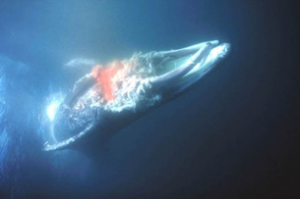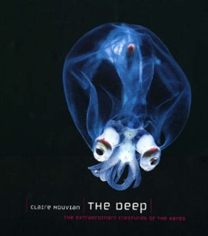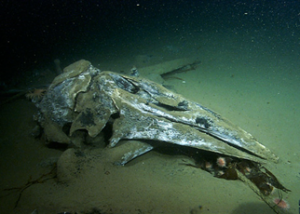In honor of Moby Dick, I found myself thinking a lot about whales. It’s kind of hard not to. While I think whales are pretty awesome when they’re alive, I want to talk about dead whales. I am a big fan of the deep ocean- some strange, beautiful and fantastical stuff happens down there. A few years ago I stumbled across a book called The Deep: The Extraordinary Creatures of the Abyss; it’s a collection of scientific essays and truly stunning photographs. The editor’s name is Claire Nouvian. I highly recommend it anyone who is interested in that kind of thing. I don’t personally own the book or I would have posted some of the incredible photos from it.
Anyway- back to the dead whales. One of the essays in the book was about whale fall, which I knew absolutely nothing about. Whale fall just a kind of fancy term for dead whales who sink to the bottom of the ocean. While this sounds kind of morbid, what happens after whales die has to be one of the coolest things I’ve ever read about. Whale carcasses feed the life on the ocean floor for decades. A large, full-grown whale can sustain life on the ocean floor for CENTURIES. It can take over one hundred years alone just to strip all of the meat and flesh off the bones.
Once the whale is down to just the skeleton, organisms continue to feed off of it. Some live in the soil and feed off of the scraps. After more time passes and it would appear that all of the material is broken down, new organisms move in break down the sulfide in the bones. This last stage can take anywhere from fifty to one hundred years. Researchers are discovering new species left and right from studying whale fall. What’s crazy is that they believe that some species only exist because of this; some have only been found on the ocean floor along whale migration routes. Researchers have only still don’t know a lot about it because no one even knew about whale fall until the 1960’s.
One of the themes that we’ve already discussed in class is this idea of the ocean claiming, or in this case, reclaiming a life. I know we talked about it when we discussed “A Speck in the Sea”. It’s hard to believe that a body can be re-claimed on such a huge scope. As large as whales seem, they appear so small in the ocean. It’s incredible to think that their bodies actually create an entire ecosystem.





This was so interesting to read as this is something that I’ve never really thought of before. It’s great to think that when whales die their bodies just don’t go to waste. They’re not only these large majestic creatures, but they’re also swimming ecosystems that sustain life. This may sound lame and corny, but it’s some real circle of life stuff at work.
Ryan: Great article. As a biology major who has spent quite a bit of time on the water it was a great read. It is always interesting to understand the “entire” life cycle of the ocean as things that on the surface seem wasteful and sorrowful can often take on a different view if you understand it all. Very good post and thanks for sharing. Jon